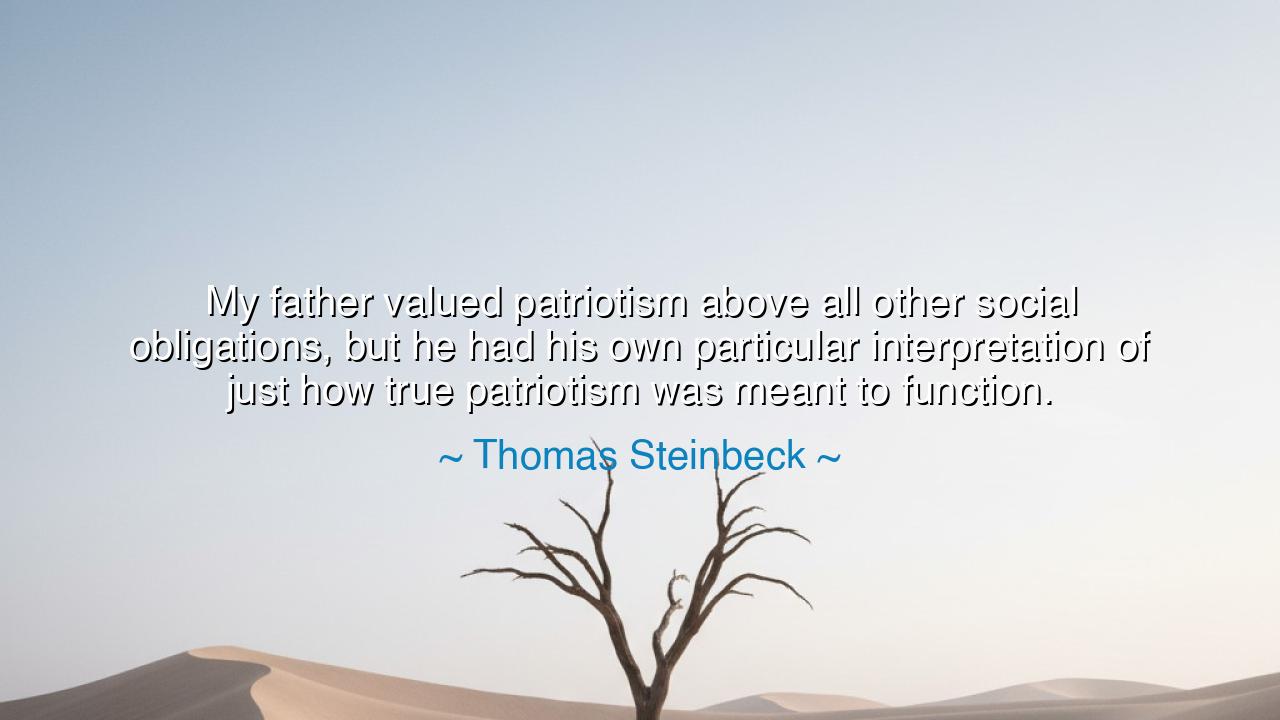
My father valued patriotism above all other social obligations
My father valued patriotism above all other social obligations, but he had his own particular interpretation of just how true patriotism was meant to function.






The words of Thomas Steinbeck—“My father valued patriotism above all other social obligations, but he had his own particular interpretation of just how true patriotism was meant to function.”—are a window into the legacy of his father, the great American writer John Steinbeck. Here, the son does not merely speak of a father’s devotion to his country, but of the deeper, more complex way that devotion was understood. For John Steinbeck was no blind worshiper of flags and anthems; his vision of patriotism was rooted in conscience, in the struggles of the common man, and in the duty to speak truth even when it was uncomfortable. Thus, the quote is not about shallow loyalty, but about the responsibility to shape one’s own understanding of what it means to love one’s nation.
The ancients too wrestled with such questions. To them, loyalty to the polis, the city-state, was sacred. Yet not all agreed on how that loyalty should be lived. For some, it meant obedience to rulers; for others, it meant defending justice above obedience. Socrates himself declared that true loyalty to Athens lay in holding it accountable to wisdom and virtue, even if it cost him his life. In this same tradition, John Steinbeck’s interpretation of patriotism was not mere submission to authority, but the courage to demand that the nation live up to its ideals.
Throughout his writings, Steinbeck portrayed the plight of the poor, the dispossessed, and the working class. In The Grapes of Wrath, he told the story of migrant families broken by the Dust Bowl, yet still striving for dignity. For him, patriotism was not served by ignoring their suffering, but by amplifying their voices. He believed that loving one’s country meant confronting its failings and lifting up its forgotten people. Thus, his version of patriotism functioned not as praise for power, but as compassion for the powerless.
History gives us similar examples. Consider Abraham Lincoln, who during the Civil War was accused by some of betraying patriotism because he challenged entrenched institutions. Yet Lincoln saw his highest duty not in preserving old forms, but in purifying the nation of slavery. His interpretation of patriotism was not about defending every tradition, but about aligning the nation with its deepest creed: liberty for all. Just as Steinbeck interpreted patriotism through service to the common people, so Lincoln interpreted it through justice, even at the cost of war.
Steinbeck’s life also bore witness to the suspicion that comes when one’s patriotism does not match the dominant definition. During the Cold War, he was sometimes accused of sympathies that undermined the nation. Yet his love for America never wavered. He simply insisted that true loyalty meant honesty, and that blind nationalism was no love at all. This is the wisdom Thomas Steinbeck preserves in his reflection: that his father valued patriotism, but always on his own terms—terms rooted in integrity, justice, and empathy.
The lesson is clear: do not let others define your patriotism for you. Love of one’s country is not uniform, nor should it be. It is lived out in the ways you choose to serve the greater good, to defend truth, to protect the vulnerable, and to speak when silence would be easier. True patriotism is not about unthinking agreement, but about devotion that challenges, refines, and strengthens the nation.
Practical action flows from this teaching. Ask yourself not whether your words sound patriotic, but whether your deeds serve your people. Do you lift up those who suffer? Do you act with fairness, honesty, and courage? Do you challenge injustice, even when it wears the cloak of authority? This is how each person must shape their own “interpretation” of patriotism—not as shallow pride, but as living commitment.
Thus, Thomas Steinbeck’s words endure as a lesson from father to son, and from son to us: value patriotism above all, but define it with conscience. For the truest service to one’s country is not blind loyalty, but the fierce, enduring love that dares to demand better, so that future generations may inherit a land worthy of devotion.






AAdministratorAdministrator
Welcome, honored guests. Please leave a comment, we will respond soon